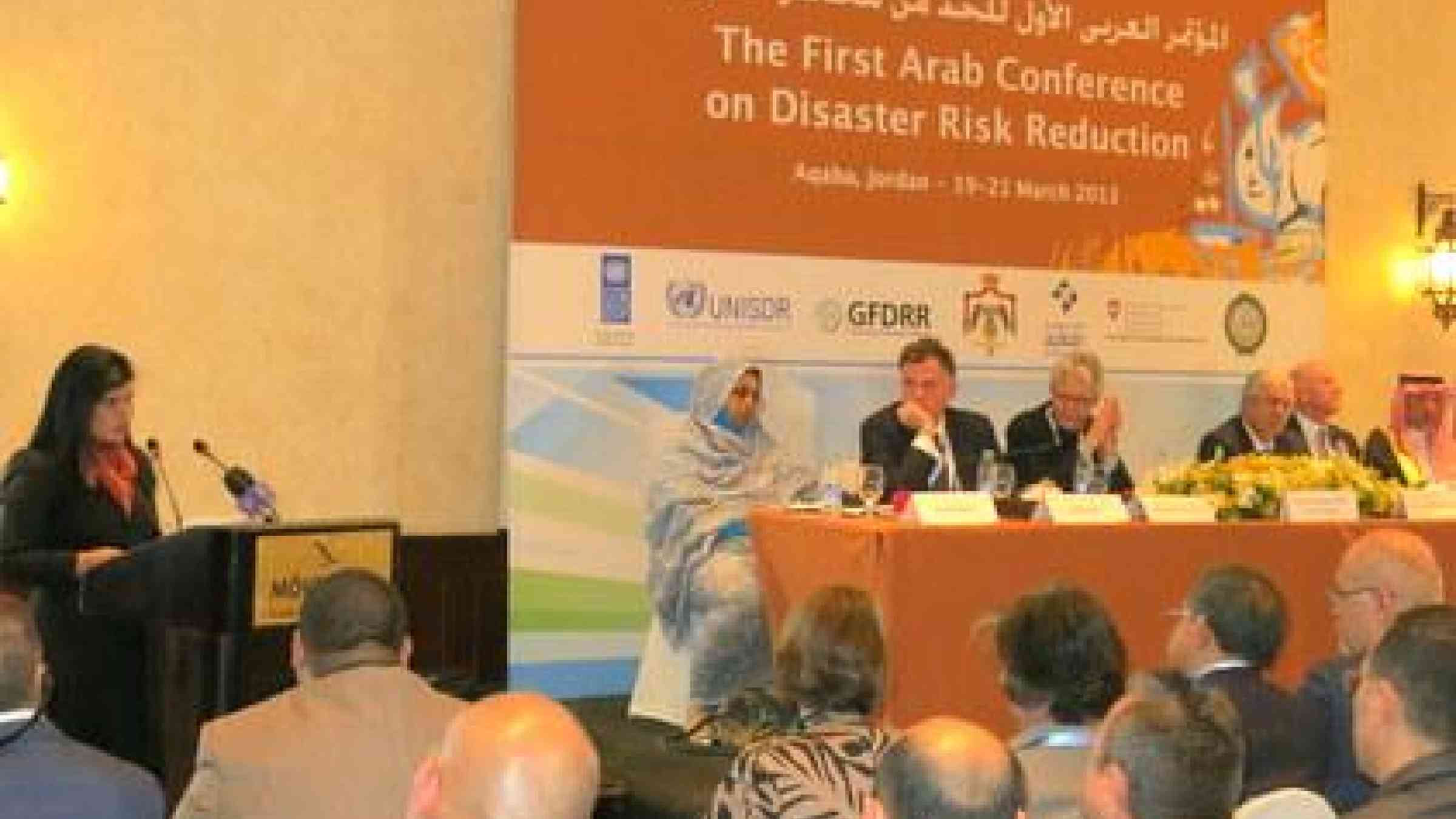Arab States seek agreement on reducing risk

AQABA, 19 March 2013 - More than 250 Representatives from the Arab States region gather today in Jordan for three days to agree on a common Arab position on the region's input to the international framework for disaster risk reduction which will be agreed at the 2015 World Conference on Disaster Risk Reduction. The 1st Arab Regional Conference on Disaster Risk Reduction is being held under the Patronage of Her Royal Highness Princess Sumaya bint El Hassan, President of the Royal Scientific Society.
In Her speech during the opening ceremony the Princess said "We meet at a crucial time for Disaster Risk Reduction in the Arab World. For, in a relatively short period, a number of crucial factors have magnified the exposure and vulnerability of cities in the Arab region to disaster and its aftermath. The explosive increase in urban populations in recent decades, coupled with poor planning in land use, has expanded the potential of hazard to cause havoc in our cities. A shocking absence of enforced building construction standards, a sharp rise in urban poverty, and the growing and unchecked impact of climate change are among other factors that must make us even more determined to act decisively." She added "I am delighted that this conference, which brings together so many committed and competent experts in various fields, will debate and discuss the rapidly-evolving global issues of concern with regard to disaster risk reduction. Crucially, you will identify and interpret the implications of these issues for the particular contexts of the Arab region."
Margareta Wahlström, United Nations Special Representative of the Secretary-General for Disaster Risk Reduction and Chief of the UN Office for Disaster Risk Reduction (UNISDR), said: "UNISDR is encouraged to see the Arab States coming together to discuss disaster risk reduction and create a regional platform. The timing could not be better as we are looking forward to the Arab region making a significant contribution towards revising and renewing the existing framework for disaster risk reduction, the Hyogo Framework for Action."
The First Arab Conference on Disaster Risk Reduction brings together key actors to launch a Regional Platform for Disaster Risk Reduction, a consultative forum to coordinate disaster risk reduction in the Arab region on a regular basis. This regional coordination mechanism will facilitate exchanges between countries and partners, and provide a platform where Arab politicians, policy makers, academia and other experts can periodically discuss progress and challenges facing the region with regards to disaster risk reduction.
The Conference is also expected to announce an Arab Declaration on Disaster Risk Reduction in Cities. This declaration aims to establish benchmarks for reducing disaster risks in Arab cities, considering the fact that the Arab world is predominantly urban, with almost sixty per cent of the population living in cities across the region.
"Arab countries have made significant progress on the development front over the past decades," commented Jordan Ryan, Director of the Bureau for Crisis Prevention and Recovery in the United Nations Development Programme. "However, such gains are put in jeopardy because of weak systems for disaster preparedness, which make the population vulnerable to a multitude of environmental disasters, especially in urban areas" he added.
Different parts of the Arab region are regularly exposed to a number of risks including geological hazards such as earthquakes and landslides, in addition to weather related hazards such as flash floods, extreme temperature events, drought, sand storms, wildfires and cyclones.
According to the latest data provided to UNISDR by the Belgium-based Centre for Research on the Epidemiology of Disasters (CRED), over the last 30 years in the Arab states, there were a total of 164,164 persons killed, 70 million people affected and reported economic damages of $ 19.2 billion due to disasters triggered by natural hazards.
The outcomes of these regional deliberations will be presented at the Global Platform for Disaster Risk Reduction from 19-23 May 2013 in Geneva, the world's foremost gathering of stakeholders committed to reducing disaster risk and building the resilience of communities and nations.
"It is the first time that decision makers, ministries, organizations and institutions from various disciplines in the Arab states come together to share experiences and promote regional coordination for reducing the impact of natural disasters", Beat von Däniken, SDC Regional Director of Jordan, Lebanon, Syria and Iraq stated. "This is a fabulous platform for sharing good experiences and bringing stakeholders from different countries together. It is also a strong sign to the world that the Arab states are getting better organized and contribute to a worldwide discussed consensus about disaster risk reduction", he added.
This first Arab Regional Conference on Disaster Risk Reduction is co-organized by the United Nations Office for Disaster Risk Reduction (UNISDR), the United Nations Development Programme (UNDP), the Hashemite Kingdom of Jordan, the Aqaba Special Economic Zone Authority (ASEZA), the Swiss Development Cooperation (SDC) and the League of Arab States. The Conference is organized under the patronage of Her Royal Highness Princess Sumaya bint El Hassan, President of the Royal Scientific Society.